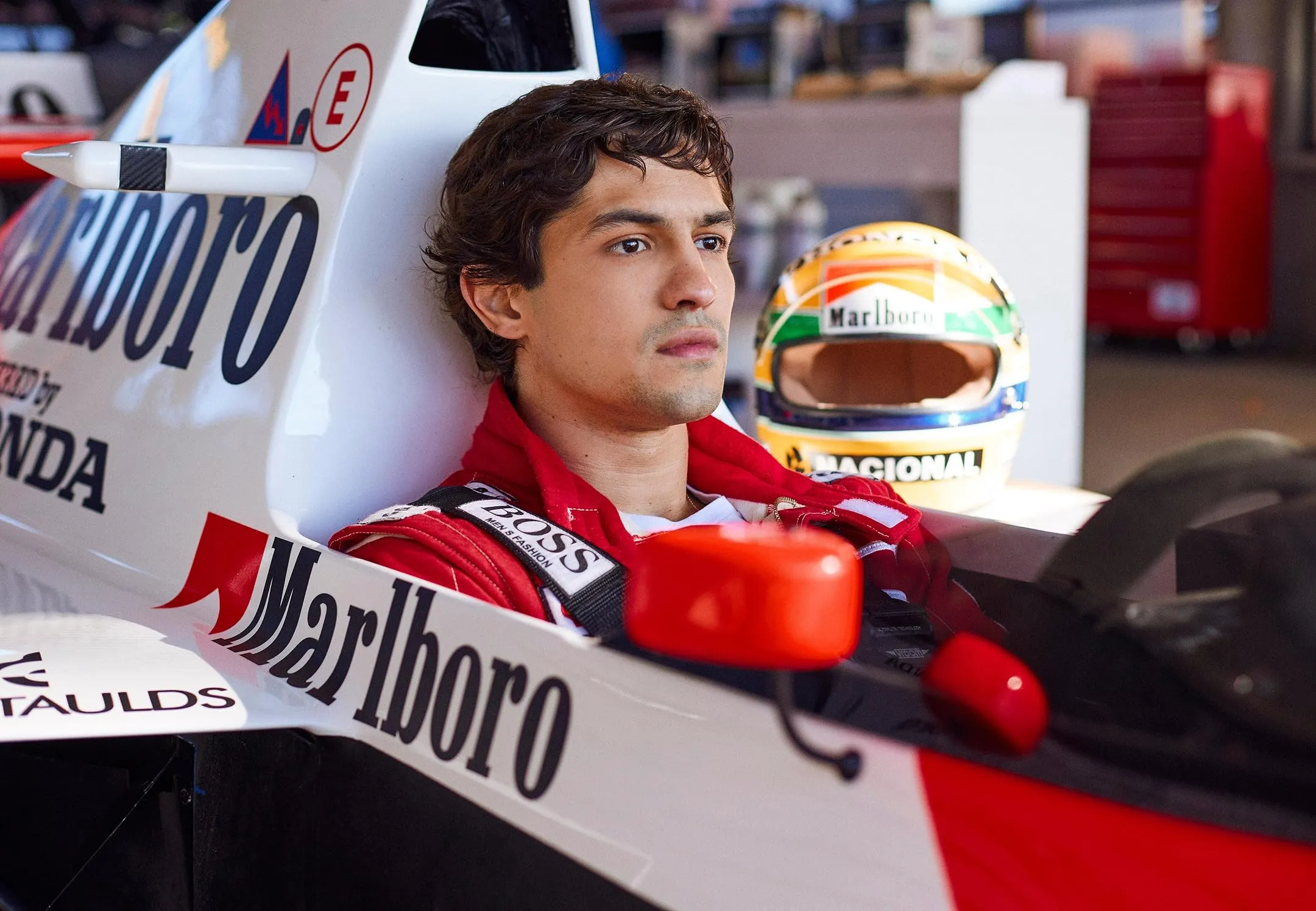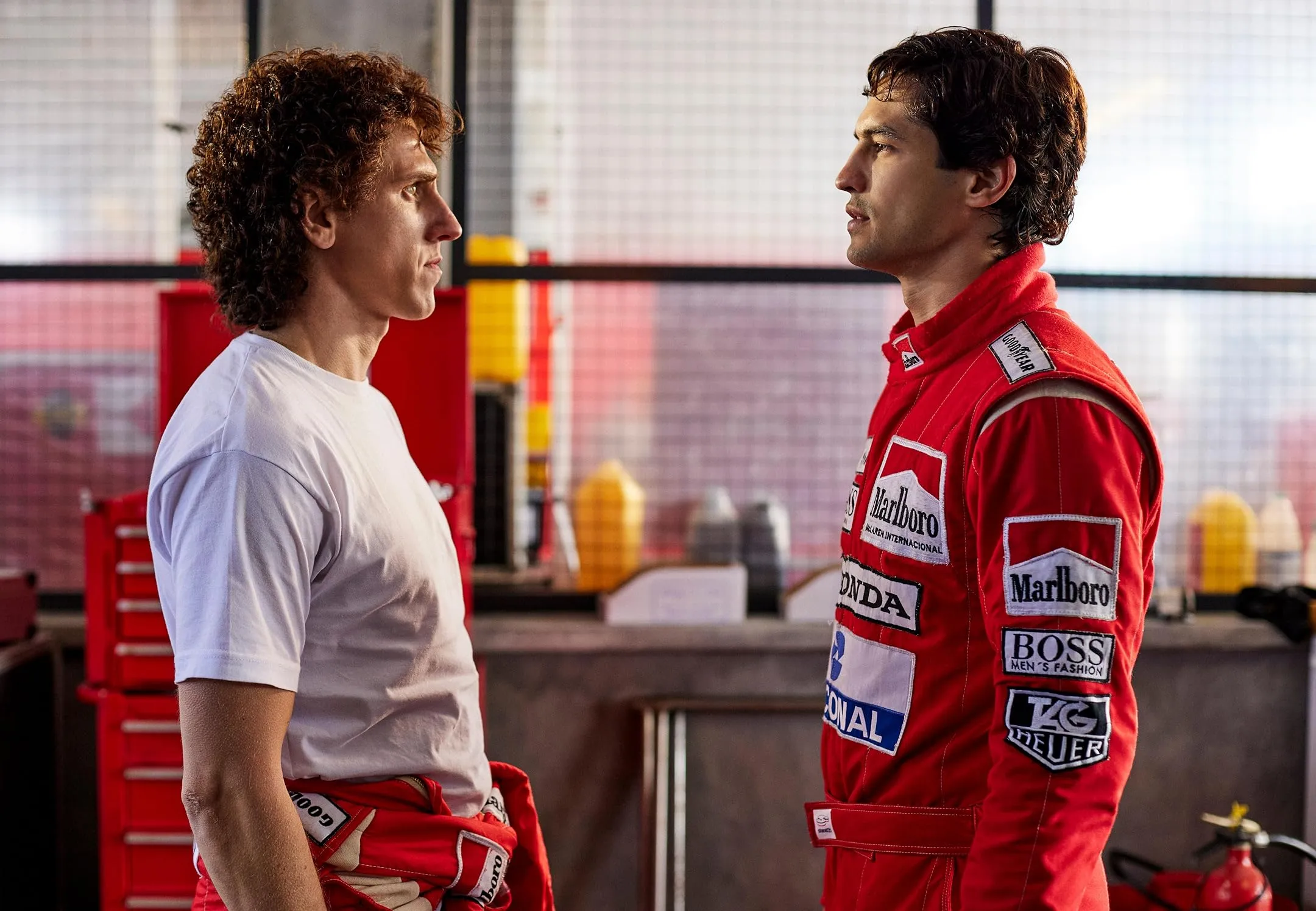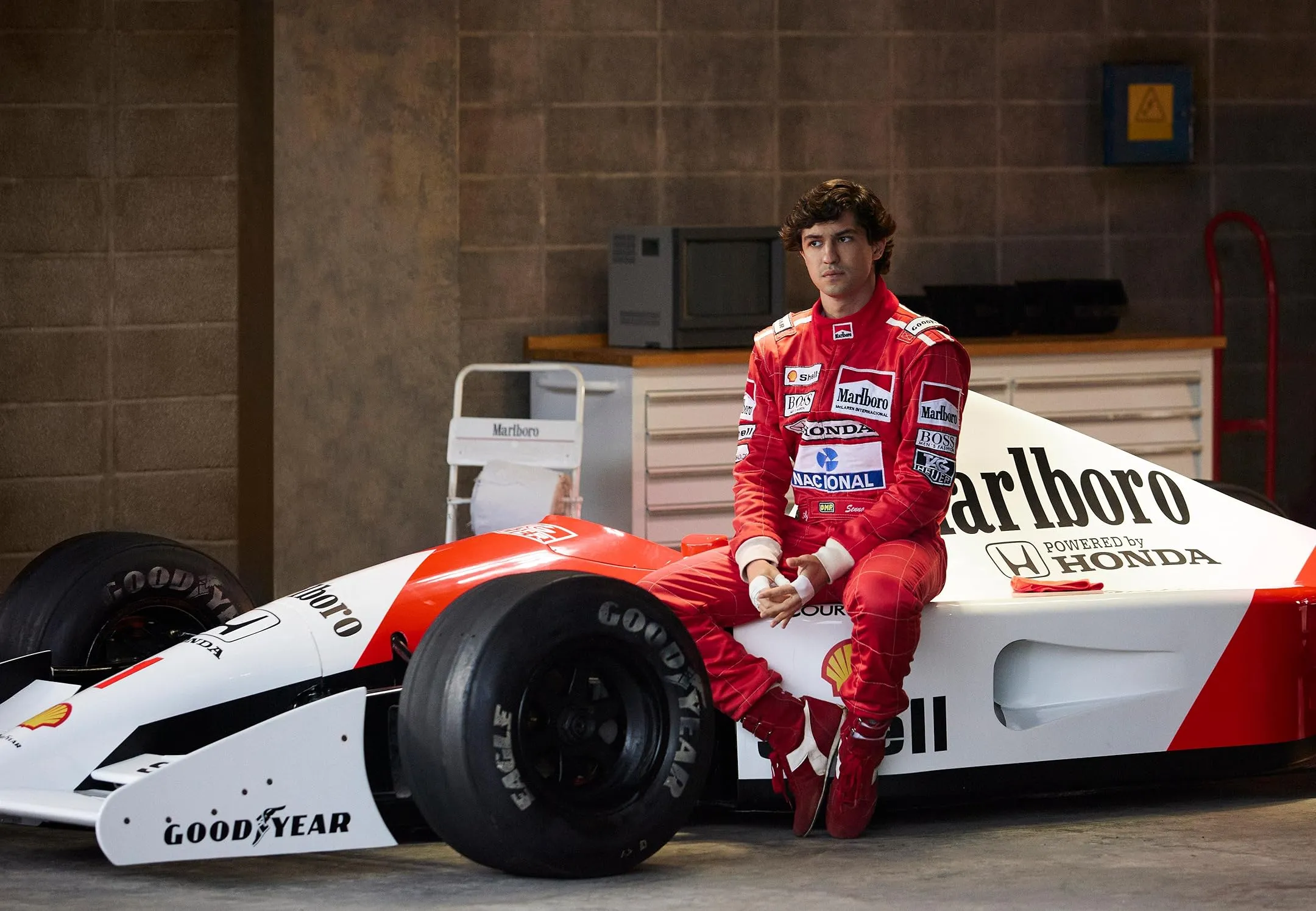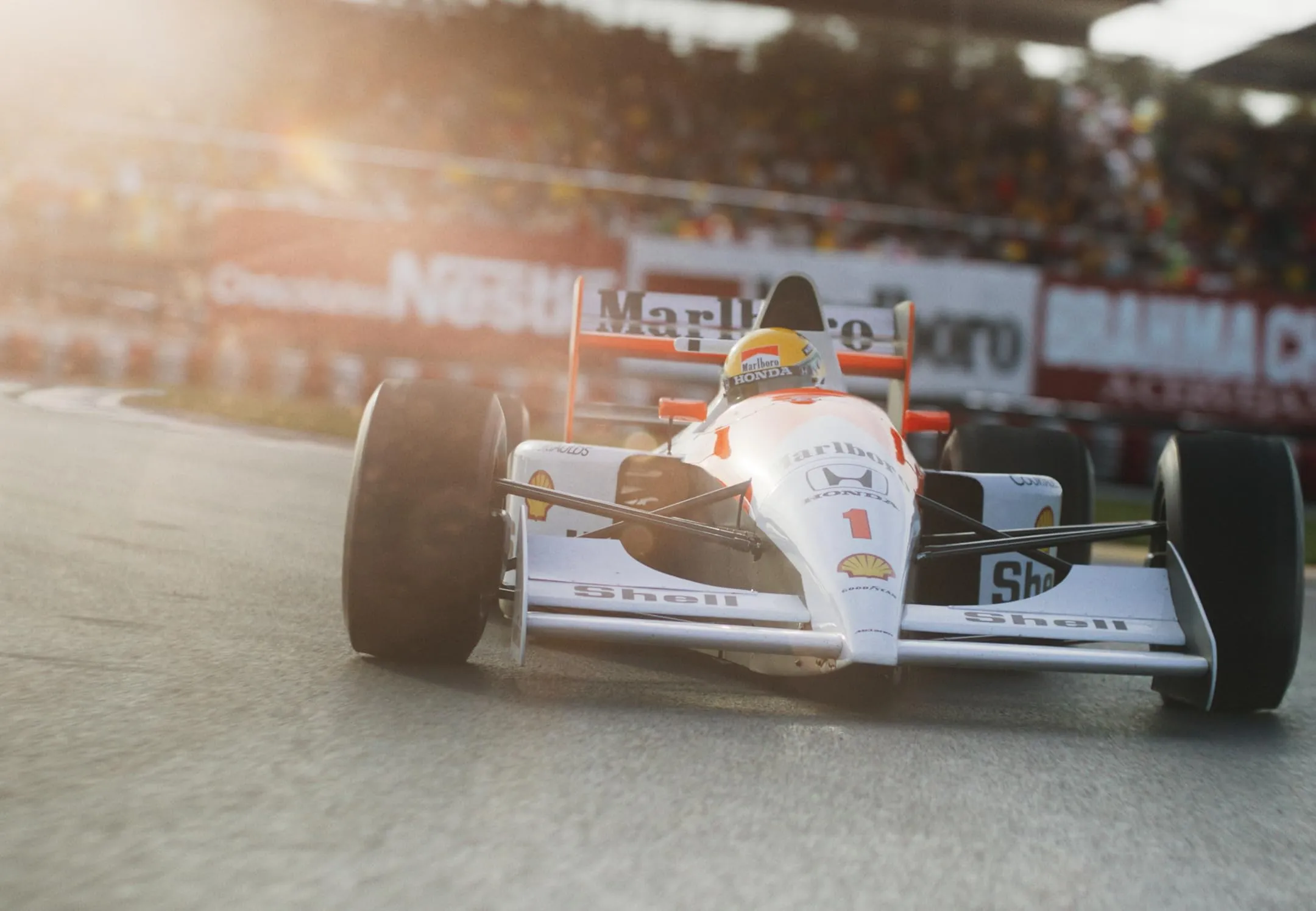Netflix’s latest limited series, “Senna,” is a comprehensive look at one of motorsport’s most legendary individuals, Ayrton Senna. This six-episode saga, which will air on November 29th, follows the life of the Brazilian racing phenomenon who transcended the bounds of Formula One racing.
Ayrton Senna was more than a driver; he was a national hero who symbolized hope in Brazil during a difficult political period. Senna rose from go-karting in São Paulo to become a three-time world champion, captivating worldwide imagination with his exceptional skill and passionate attitude to racing.
The series follows Senna’s incredible journey, from his early days fighting racial stereotypes in England to his pioneering Formula One career. Senna is portrayed by Gabriel Leone, who brings to life a man known for his unwavering resolve and nearly mythical racing abilities.
Beyond conventional sports footage, “Senna” tells a deeper story about passion, resilience, and the human spirit. It investigates how one person can inspire an entire nation, turning racing into a metaphor for overcoming challenges and realizing impossible goals.
For motorsport fans and cultural historians alike, this series promises an intimate insight into the life of a racing legend whose impact went far beyond the racetrack, making him a global figure remembered long after his untimely death in 1994.
Racing Passion: Senna’s Electrifying Journey to Motorsport Immortality
Growing up in São Paulo in the early 1960s, Ayrton Senna was destined for something special. His fate was sealed from the moment he touched the steering wheel of a go-kart. Sensing a spark of fire in his young son, his father became his first and most important backer, instilling a killing instinct that would define Senna’s whole career.
During the 1980s, Brazil’s streets were more than just roads; they served as a backdrop for a nation in urgent need of hope. Senna was more than a racer; he was a light of hope during political upheaval and economic instability. When others saw restrictions, Senna saw opportunities.
His rise to racing success was not easy. When Senna moved to England in the 1980s, he faced considerable hurdles. As a Brazilian on mostly European racing circuits, he faced mistrust and subtle discrimination. However, hardships served as fuel for his amazing talent. In Formula Ford and Formula 3, he dominated and astounded competitors and critics with his natural talent.
When Senna entered Formula One in 1984, he quickly rose from a promising newcomer to a real threat. McLaren became his ultimate platform, allowing his racing philosophy to fully flourish. He wasn’t just driving; he was reinventing what racing could mean. Every turn and race became a canvas for his exceptional ability.
His battle with French driver Alain Prost has become legendary. More than mere competition, their interactions were a complicated ballet of skill, ego, and mutual respect. They pushed each other to unprecedented levels, resulting in some of Formula One’s most memorable moments. Their clashes were more than just races; they were epic conflicts that captivated the world’s imagination.
Senna’s three World Championships were not just titles; they were statements. He drove with a combination of mathematical accuracy and almost mystical intuition. Rainy tracks became his playground, where he appeared to defy physics. Other drivers saw tracks, while Senna saw possibilities.
His driving technique was poetry in motion: fierce but measured, passionate yet accurate. He did more than just race; he made racing an art form. Every lap was a story, each championship a chapter in a larger-than-life tale.
Tragically, his magnificent adventure ended too soon at Imola in 1994, but his legacy had already been engraved into motorsport history. Senna was more than just a racer; he was a phenomenon who forever altered how the world viewed racing.
Beyond the Racetrack: Senna’s Human Landscape
A racing legend’s helmet concealed a heart inextricably linked to his surroundings. Ayrton Senna’s life was a complex tapestry of relationships that went far beyond the boom of engines and the blur of racing courses.
His family was the foundation of his incredible adventure. His sister Viviane was not just a sibling but also a source of strength during his turbulent career. Their parents, particularly his father, noticed and nourished his enthusiasm from an early age, turning a small boy’s go-karting aspirations into a global racing phenomenon.
Senna’s narrative revolved around romantic relationships. Xuxa Meneghel, Brazil’s most popular television host at the time, was more than a collaborator; she was a cultural icon who shared the spotlight with Senna. Their romance became a media sensation, symbolizing the convergence of athletics and entertainment in Brazilian popular culture.
Adriane Galisteu signified another key milestone in his personal life. Senna’s relationship exposed his humanity, reminding us that behind his superhuman racing abilities was a guy dealing with love, loss, and personal connections.
Senna’s media engagements were a careful dance. He recognized the power of public perception; therefore, he meticulously managed his image while maintaining an authentic connection with journalists and fans. He was more than simply a racer; he was a savvy communicator who understood how to use media to spread his message and inspire millions.
These relationships offered a nuanced picture of Senna as a racing champion and a complex human juggling love, fame, and personal goals. His life was a testament to the extremely human story of connection, passion, and personal suffering that lies behind every great character.
Senna’s personal life was as complex and captivating as his racing career, a story of relationships that transcended the racetrack and touched the hearts of millions.
Racing Beyond Borders: Senna’s Triumph Over Adversity
In the turbulent 1980s, Brazil, emerging from decades of military dictatorship, sorely needed a hero. Ayrton Senna became more than a racer; he was a beacon of hope in a country dealing with economic hardship and political turmoil.
Brazil’s streets were more than just roads; they were a canvas for community struggle and hope. Each of Senna’s races became a national event, bringing a fragmented society together through motorsport’s sheer, electric thrill. When Senna raced, Brazil came to a halt. Millions watched, holding their collective breath, seeing his victories reflect their potential for greatness.
His influence transcended the racing world. Senna represented something profound in a society plagued by poverty and political tyranny: the promise of rising above restrictions. He wasn’t only competing on international tracks; he was carrying the hopes of millions who saw in him a vision of what Brazil could be.
The Ayrton Senna Foundation was his most lasting legacy. Beyond trophies and titles, he saw that true winning entailed lifting others. He continued battling for those most needed opportunities through educational initiatives and social activities.
Senna’s story was revolutionary. He went from racing champion to national symbol of tenacity, hope, and opportunity. With each turn of his race vehicle, he was authoring a story of success – not only for himself but for an entire nation wanting to break free from its historical restrictions.
His legacy was judged not by racing lap times but by the hearts he touched and the hope he ignited throughout Brazil and beyond.
Engines of Emotion: Crafting Senna’s Cinematic Journey
Gabriel Leone does not only play Ayrton Senna; he resurrects a legend. With compelling intensity, he transforms from actor to live incarnation of Brazil’s racing legend. Every motion and delicate expression captures Senna’s complicated inner world, including his calculated perfection, blazing passion, and vulnerability under the helmet.
The show brings Senna’s world to life through a series of performances. Pâmela Tomé’s portrayal of Xuxa is especially impressive, capturing the contemporary mood with eerie accuracy. Her likeness to the genuine TV personality is startling.
Vicente Amorim and Júlia Rezende face the daunting task of turning a global sports legend into captivating television. Their style alternates between intimate character studies and high-octane racing dramas. However, evaluations indicate they do not always succeed, occasionally losing the racing’s intrinsic intensity in highly styled photography.
Racing sequences become technical battlegrounds. While the directors strive to portray Formula One’s electrifying intensity, they sometimes fall short. CGI effects and unnecessary camera cuts can sometimes detract from the natural authenticity that viewers want. The racing has a more staged feel.
The production design transforms into a time machine, meticulously reproducing 1980s and 1990s Brazil. Every frame, from period-appropriate clothes to carefully crafted set pieces, aims to take viewers into Senna’s world. The devotion to historical detail is more than just a backdrop; it’s a character.
The series’ central challenge is to capture a national hero’s soul. Leone’s performance implies that the answer resides not in great gestures but in nuanced humanity. He portrays Senna as more than just a racing champion but as a complex human being dealing with unusual circumstances.
The series eventually becomes a delicate dance between celebration and critical examination, encouraging viewers to see Senna beyond the racing legend, as a guy with enormous promise who was sadly cut short.
Driven: The Soul Behind the Speed
Senna’s story goes beyond racing; it’s a profound analysis of human potential pushed to extreme lengths. At its core, the series captures the spirit of passion: an unwavering pursuit that converts personal goals into collective inspiration.
Senna’s determination was more than just a quality; it was his oxygen. Every racing moment signified more than competition; it was a battle against restrictions, societal expectations, and personal boundaries. His story demonstrates how unbridled devotion can propel a person from local talent to a worldwide phenomenon.
The series does not shy away from the darkest side of ambition. Behind the spectacular racing successes lie significant personal sacrifices. Senna’s journey illustrates the intricate cost of achieving success, with relationships questioned, personal time sacrificed, and physical dangers continually welcomed.
His legacy goes well beyond racing trophies. He proved that remarkable accomplishments are born from persistent determination and profound self-belief, symbolizing possibility for an entire generation. Through his story, audiences see how one person’s passion can change attitudes, inspire millions, and transcend the confines of their career.
More than a sports biography, “Senna” is a meditation on human potential. It demonstrates how remarkable goals, pursued with unwavering conviction, can shape not only individual destiny but entire societal narratives.
The series concludes with a deep question: what happens when raw talent meets unyielding spirit? Senna’s life provides a strong answer.
Racing Immortal: Senna’s Eternal Flame
Netflix’s “Senna” does more than follow a racing career; it resurrects a legend who transcended sport. The series portrays Senna as a driver and a transformational cultural force who demonstrated the power of an unbreakable spirit to an entire nation.
The documentary-style series captures something fundamental by combining personal vulnerability with tremendous professional achievement: genuine greatness isn’t about winning but overcoming overwhelming odds. Senna became more than a racer; he represented hope throughout Brazil’s most difficult times.
His story is ageless, serving as a testament to human potential and demonstrating how passion may have far-reaching consequences when pursued with unwavering conviction. Gabriel Leone’s insightful account demonstrates how one amazing life may inspire generations.
More than a retrospective, “Senna” serves as a mirror for our collective dreams, reminding us that legends are born not only of skill but also of unwavering tenacity and an unquenchable desire to go beyond imagined limits.
The Review
Senna
"Senna" is a captivating yet incomplete investigation of a motorsport legend. The series successfully converts Ayrton Senna from a historical figure to a living, breathing human being - complex, passionate, and deeply inspiring. Despite occasional stumbles in narrative execution, the documentary-style drama captures the essence of Senna's amazing journey. The series is anchored by Gabriel Leone's transforming performance, which adds incredible depth and sincerity to a story that could easily become a hagiographic tribute. The production carefully balances personal vulnerability and professional competence, giving spectators a complex portrayal of a national hero.
PROS
- Exceptional performance by Gabriel Leone as Senna
- Authentic historical reconstruction of 1980s-90s Brazil
- Compelling narrative of personal and professional struggle
- Nuanced exploration of Senna's cultural significance
- Strong supporting performances
- Detailed portrayal of motorsport dynamics
CONS
- Occasionally inconsistent pacing
- Some racing sequences feel over-stylized
- Potential oversimplification of complex personal relationships
- Moments of narrative melodrama





















































